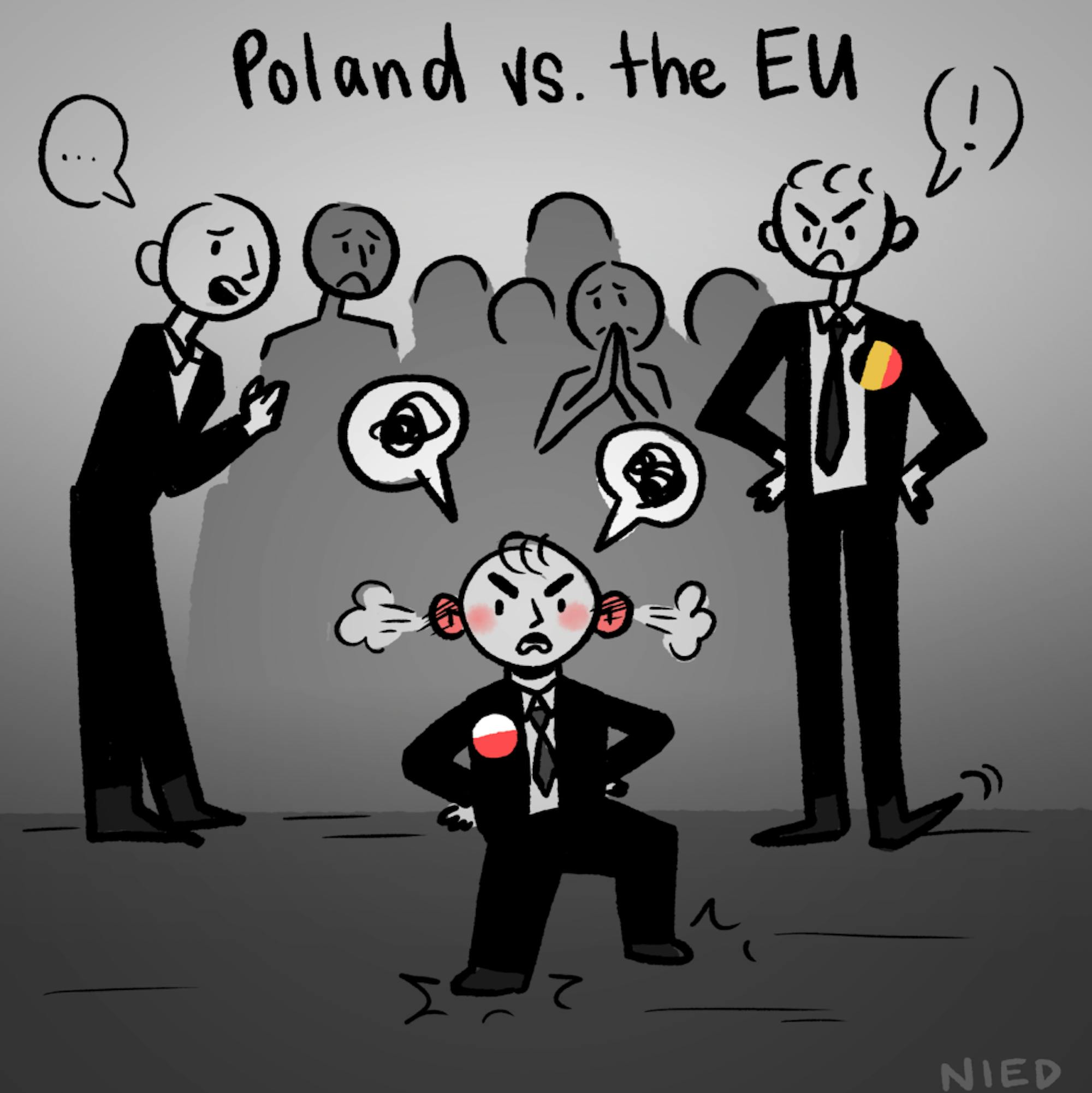The right-wing Law and Justice (PiS) party has been governing Poland for the last six years. The ruling coalition has turned a blind eye to and even discretely defended societal measures that go directly against the European Union’s stance, notably on issues like abortion and LGBTQ rights. These measures are a populist attempt by the PiS to ensure the loyalty of their crucial rural base, and they have already maintained the party at the helm through two elections. The country that birthed Lech Walesa and the fight against Soviet hegemony abruptly turned back on its history, bringing the Kaczyński twins, Jaroslaw and Lech, and their bigoted party to power.
This is yet another chapter in Poland’s long and tumultuous history, marked by attacks and occupations from neighboring powers. After the Second World War, it followed much of the Eastern Bloc and fell under the USSR’s proxy control, lasting into the early 1990s whensocial unrest wrestled the country back into democracy.
Poland made immediate efforts to redevelop its economy into a free-market model. It opened to the West and initiated accession talks with the EU in 1994. It became a full member in 2004, with many Poles quickly jumping at the opportunity to resettle and work in other EU nations. As of 2011, over two million Poles are estimated to have left Poland, with 80% choosing an EU country to resettle in. This diaspora has contributed in a key way by transferring funds back to Poland and establishing important trade markets.
Hence, there is a strong financial incentive for Poland to entertain friendly relations with Brussels and remain in the Union. The country already has the Union’s 14th lowest GDP per capita and receives much more moneyfrom Brussels than it contributes. The EU has enabled Polish economic development since accession and markedly improved the country’s financial stability post-USSR, while also protecting it from Russian interference in its internal affairs.
But while Poland is famously pro-European, it is now in the midst of a heated dispute with Brussels. The real danger lies in how Poland’s government has dismantled many of the country’s most crucial checks and balances, starting with its judicial system. In the U.S., the term “court-packing” is used to describe the appointment of court judges based on one’s partisan affiliation to ensure a lasting political impact on judicial policy. The PiS has taken things even further. The ruling coalition has enacted laws that effectively give the government control over the whole judicial pipeline. From judge training and naming to choosing inspectors that investigate any judge that may oppose its political agenda, the PiS has full power over Polish courts.
The EU has been watching these developments with concern, attempting to prevent further damage to what it calls “the rule of law” in Poland. The European Court of Justice had previouslyblocked some of Poland’s reforms, forcing the government to comply with Brussels’ injunctions. But a controversial ruling shuffled the cards.
Poland’s prime minister asked its Supreme Court, now packed full of loyal judges, to declare that Poland’s constitution has precedence over EU law, an interpretation that would go against the very core of the Union’s charter. In a perhaps unsurprising result, the court granted Polish law primacy over European law. Brussels responded harshly, imposing a record fine of one million euros per day on Poland and withholding 42 billion euros from the country’s share of the EU COVID-19 recovery package, a massive economic blow to the Eastern nation. Now, the two sides are locked in a bitter war of trenches, no one willing to budge and cede ground to their adversary.
The border crisis with Belarus is another blow to the EU’s efforts to confront Poland. The Union has taken note of Polish efforts toblockmigrants massed at Minsk’s border from entering EU territory. Poland might end up weaponizing its borders, much like Belarus and Turkey, if it feels too pressured by Brussels.
Poland is not looking to exit the EU but the danger of confrontation remains. Every move sets a dangerous precedent for other rowdy EU members, such asHungary, to employ to undermine the EU’s grip over its member states. While the Brexit referendum of 2016 was a monumental change, the UK could afford to leave the EU when differences arose, and the EU was able to absorb Brexit and move on. The Polish crisis, on the other hand, is a bombshell. Brussels must quickly address the issue to prevent a much larger crisis. Poland’s government is singlehandedly undermining the EU ideal in which countries can collaborate and live under the umbrella of overarching laws and principles. Poland’s blatant disregard of the EU central government may create a sentiment that Brussels is incapable of ruling its members, which may scare off prospective members from trying to join and lead to polarization among EU nations that could paralyze Brussels’ institutions.
Theaggressive approach taken by the EU’s leadership to stop Poland is key to the future survival of the Union. If Poland wants to benefit from the economic stability offered by the EU, it also has to abide by the organization’s fundamental values. The separation of powers is key to sustainable governance. Poland’s central government is beginning to look like a neo-USSR politburo trying to strong-arm every institution — moving in an increasingly anti-democratic direction.
Brussels weathered the Greek crisis that almost blew up the Eurozone. It now has to brave a Polish winter that may bite deep into the Union’s credibility if left unaddressed.






